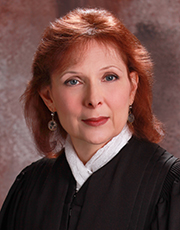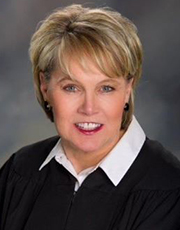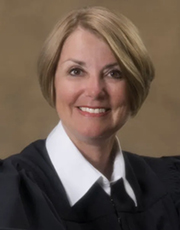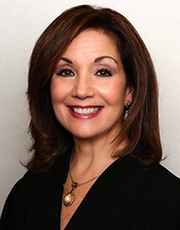YOUNGSTOWN, Ohio – When Judge Cheryl Waite, the first woman ever elected to Ohio’s Seventh District Court of Appeals, attended the Ohio Judicial Conference early in her career, there was no wait in the ladies’ room between sessions.
Now she says it’s as busy as intermission at a concert. And that’s a good thing.
Judge Renee DiSalvo, one of two women currently serving in the Youngstown Municipal Court, says when she began her career as an attorney over 25 years ago, the judiciary was “very chauvinistic.” She heard inappropriate comments about her attire and would be mistaken for a stenographer when she arrived for a deposition.
DiSalvo says other attorneys seemed to think she was unprepared or would underestimate her because she was kind and did not use coarse language.
“Things have changed a lot,” DiSalvo says. “You see many more women on the bench today. More women in the practice.”
There are currently 213 women serving as state court judges in Ohio, which is 37% of the 569 total positions, according to the National Association of Women Judges. While this is higher than the national average of 34%, women comprise more than half of the U.S. population.
The first female judge in Mahoning County was Beth Smith, who was elected to an area court in 1988 and later was elected judge of the county domestic relations court.
Melissa Byers-Emmerling was the first woman elected to a judgeship in Columbiana County, serving as the only judge in East Liverpool Municipal Court for 30 years.
The late Maureen Cronin, the first woman elected judge of the Common Pleas Court general division in Mahoning County, took to the bench in 1995.
In 2018, Columbiana County Common Pleas Court Judge Megan Bickerton was the first woman elected to that seat.
Youngstown Municipal Court Judge Carla Baldwin was the first African American female elected as a judge in Mahoning County in 2017.
And in 2001, Judge Theresa Dellick became the first woman to serve as the juvenile court judge in Mahoning County.
In Waite’s time on the appeals court bench, more women have joined her. The honorable Mary DeGenaro served from 2001 to 2018, and Kathleen Bartlett was appointed from 2018 through 2019.
Today, three of the four seats on the Seventh District Court of Appeals are held by women with Judge Katelyn Dickey recently joining Waite and Judge Carol Ann Robb.
JUDGE CHERYL WAITE
When Waite got her “dream job” on the bench in 1997, she was one of only six women on the court of appeals across Ohio. She also was one of the younger judges on what was considered a “more seasoned” bench. When she ends her current term, she will have been there 30 years.

“I absolutely love what I do. Every day is a new challenge. Every day is a new opportunity and it’s been not only fascinating but intellectually stimulating,” Waite says. “You just can’t get bored, really, doing what I do.”
Although there were other female judges in the area when she first ran, Waite says they were rare.
“Obviously things have changed a great deal in the ensuing years, I’m really happy to see that,” Waite says. “It’s exciting for me to see young women practicing in front of us and young women running for office. I’m really encouraged.”
Waite enjoys mentoring young women who are interested in the law, but she also enjoys being a mentor for young men.
“I think it’s equally important, maybe even more important for more men to see women in positions of authority where maybe they haven’t so much before,” says Waite.
Waite does not believe there is a great difference between male and female judges – a great judge needs patience, compassion and to be diligent, she says.
“I think it’s good to have a lot of diversity on any court of review,” Waite says. “Even though we may come to the same conclusion, many times our life experiences, and that might include gender and age, bring a nuance to the bench that you might not otherwise get if it was more homogenous.”
JUDGE THERESA DELLICK
Dellick enjoyed practicing law and trying cases, but says she became a judge by accident “through a series of circumstances.” She was appointed to the bench after running a nearly successful write-in campaign, taking the county court seat vacated by the judge she had run against in 1999. Then she was appointed to her current seat in 2001.

“Don’t become a judge just to say you’re a judge. It should be more of a calling instead of ‘I want to be a judge for the title,’” Dellick says. “We should never seek positions for title or prestige.”
When talking to other women who want to become a judge, she reminds them they need to determine who they are and to be themselves, not someone else.
“Be who you are because diversity is powerful,” Dellick says. “Our diversity strengthens us and makes us beautiful. So be who you are and let that add to this colorful patchwork of life that we have here.”
She sees women and minorities gaining momentum in the profession of law and hopes more of them consider law school.
Dellick encourages young attorneys to be humble and ask questions, realize they don’t know everything and remember they are public servants.
Being elected to the bench is a “gift” bestowed by the voters and should be taken seriously, she says. Court decisions should be made quickly and with full consideration that people’s lives are held in the balance.
Pro bono work and mental health-related work earlier in her practice helped her after she became a judge, Dellick says. In her juvenile court, she championed six certified specialized dockets – the drug and alcohol treatment docket, the family dependency treatment court, mental health court, sex offender treatment court, reentry court and education court.
She finds juvenile court to be “mission work” where every employee has a passion to help young people.
“One mission of our entire court is that you can inspire hope… inspire that you can do, and you can achieve,” Dellick says. “We have a purpose here that you can do better and that this isn’t your final stop or your only stop in life. Our job is to divert, not to keep you here in our system… We are doing our best to be – instead of the pipeline to prison – the pipeline to success.”
JUDGE CAROL ANN ROBB
Robb was the first person from Columbiana County elected to the Seventh District Court of Appeals in 98 years, taking office in 2015. The last person, Judge Louis T. Farr of Lisbon, served from 1917 to 1934.

“I knew early on I wanted to be a lawyer, but quite frankly I did not know how to get there,” Robb says.
A friend introduced her to an attorney, who convinced her she belonged in law school.
In turn, Robb has mentored other young people – women and men – encouraging them to use their strengths, gifts and talents.
Robb says she realized that many defendants coming before her as a judge in municipal court had lost hope. She implemented a Bridges Out of Poverty program, training those in the legal profession to understand the barriers generational poverty creates for offenders and to devise strategies to help them overcome it.
Robb also implemented Successful Treatment and Recovery, the first certified mental health docket in Ohio, and mentored other courts on how to start one. She has served on the Ohio Supreme Court’s Special Docket Advisory Committee and the Special Docket Commission.
As a college student studying business administration, and then later in law school, Robb learned there were people who did not welcome a woman studying for those professions.
“I quickly came to the conclusion that their unacceptance of me was their problem,” she says. “It was not my problem. And so, I just worked very hard. I did not make an issue of things when obstacles were placed in my path. I just went over them.”
Women may see the world differently and Robb believes that all judges bring their own life experiences to the bench.
Because of that, she says many continuing education classes in her field include bias awareness training, helping students to recognize the biases that they may not realize they have.
“That’s human, but I truly hope we all aspire to just apply the law with that proverbial blindfold. You know lady justice wears a blindfold holding the scale of justice and that symbol is there for a reason,” she says.
At one point, people were eager to see women break the glass ceiling and Robb believes that gave women an advantage. However, she adds, that sentiment has rightfully leveled out.
“I think we all aspire to just be viewed and valued based upon our talents and character, not upon our gender, not upon our race, not upon our ethnic background, not upon our religion, but just the content of our character and the content of our knowledge,” Robb says. “That’s what I truly hope we all aspire to.”
JUDGE RENEE DISALVO
DiSalvo says women who have an interest in the legal profession should not underestimate themselves or overthink the process of becoming a lawyer.

“If you have that desire, don’t overlook it. It’s needed. We need diversity in the practice of law and on the bench and we’re seeing more and more of it,” DiSalvo says, adding diversity is better for society. “If we can have on the bench and in the practice of law a snapshot of the community we’re representing, our interactions will be richer. Our justice system will be richer. Our understanding of humanity will be richer, and I think we will do nothing but benefit from that.”
DiSalvo believes this adage: “Never be afraid to go too far, for success lies just beyond.” God puts everyone here for a purpose, she says. Becoming a lawyer and a judge is hard work, but DiSalvo believes it’s worth the effort.
“Why not put that effort into something that’s going to benefit you and the people around you?” DiSalvo asks. “Put that effort in. It is so worth it, and it is so needed.”
DiSalvo says women are more likely to have a holistic approach, and more apt to look at the whole person.
“What brought you to this place and what can we do to make sure you don’t come back,” DiSalvo explains. “What other issues are surrounding this legal issue that you are facing today?”
A male judge once told DiSalvo an attorney’s goal is to keep their client out of jail or get them the best deal possible. She disagrees, believing the goal is to find justice and help their client not return to the legal system.
For instance, she hosts a clinic to help people get their driver’s licenses back.
DiSalvo also has a human trafficking docket that gives people the tools to get out of dangerous situations.
And DiSalvo is a member of the executive board of the Bair Foundation, a Christian organization that helps at-risk foster children.
